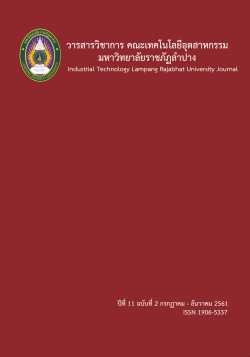Logistics Operations Optimization in Case Study to Transport Routing and Production Scheduling
Keywords:
Cluster Analysis, Differential evolution optimization, Dynamic Programing, Transport Routing, Production SchedulingAbstract
This research was aimed to develop a model of problems in logistics, Improved from existing theories and applied to solve problems in logistics. Applying a combination of theories, there are already 3 theories: Cluster analysis (CA). Differential evolution optimization (DEO) and Dynamic Programing (DP), the researcher used this model to solve two problems of logistics operation: 1) Transportation routing of school milks and products 2) Production Scheduling Example of Job Sequence Label shop.
The results of this research to applying a combination of 3 theories, Processing of transit response to distance from the research to compare with the original distance before doing research, Linear programming methods and the method of combining the 3 theories, which the researcher has analyzed in 2 forms: 1) segmenting data. Defragment the group. And the connection between 2) Divided into groups make a connection between the data groups that are arranged with the first point and then sort the data within the group. Each form can reduce the distance from the original transport of milk in schools. And shipping companies In Chiang Rai Can reduce the total distance from the pre-research and a shorter overall path than linear programming and ant colony system, distance decreased by 17.57% and 22.77%, Production Scheduling example of Job Sequence Label shop found that the average time of work in the system of work was less than other methods time was reduced by 3.59%.
References
Professional Nurses based on Perception of Magnet Hospital Characteristics of Government Hospitals in Bangkok Metropolis, Journal of The Royal Thai Army Nurses, 14(3), 22-30. (in Thai)
Jirasirilerd, K., Paitakaso R and, Mayachearw, P. (2015). Solving an simple assembly
line balancing problem by differential evolution : a case study of garment industry, Journal of Princess Naradhiwas University Vol 7 No.1 (Jan-April) 2015. pp. 153-164. (in Thai)
Mayachearw, P., (2014). Solving Location Problem, Journal of Princess Naradhiwas University, 6(1), 132-145. (in Thai)
Phalakan, B., (2014). The Problem Prioritization Methods in the Community Processes:Lesson Learned from Theory to Practice of Nursing Students at Boromarajonani College of Nursing, Sanpasithiprasong, Nursing Journal of the Ministry of Public Health, 24(1), 1-11. (in Thai)
Paitakaso, R., (2014). Differential Evolution Algorithm, [online]. Retrieved 10, Feb, 2017, From www.ubu.ac.th/~pitakaso/1302476/new_doc/ch01_s.pdf
Paiboolworachat, J. and Kulvanich N. (2014). Comparison of Clustering Algorithms for Mixtures of Gaussian Distribution, [online]. Retrieved 28, January, 2017, from: http://old.rmutto.ac.th/fileupload. (in Thai)
Winyangkul, S., (2014). Dynamic Programming, lecturer note in optimization for Logistic Engineering, Faculty of Industrial Technology, Chiang Rai Rajabhat University. (in Thai)






